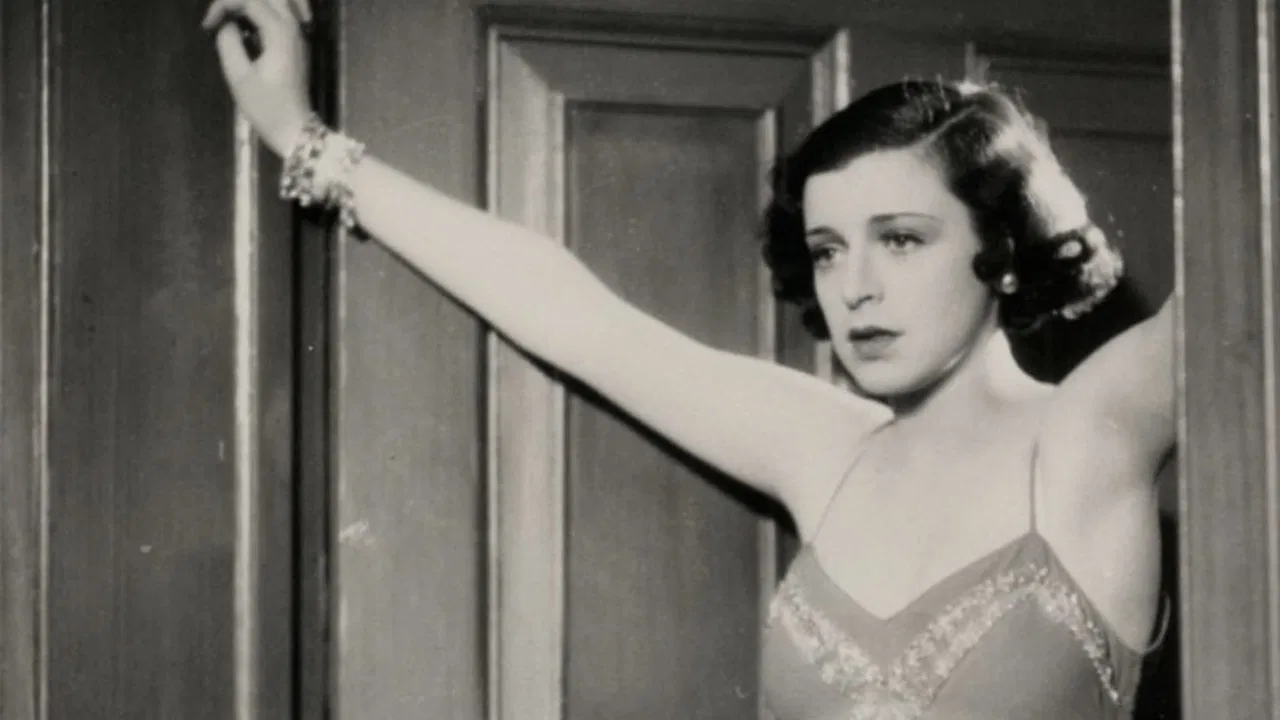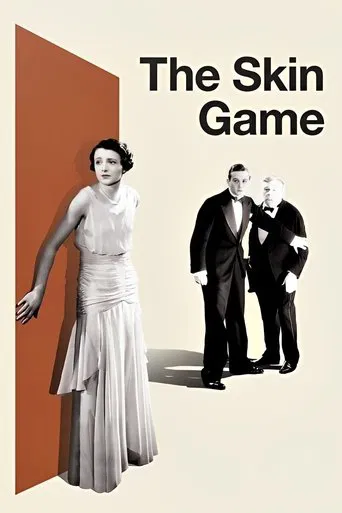

This early talkie suffers from the fact Hitchcock was rather hemmed in by the John Galsworthy play it's adapted from. He wasn't allowed to influence the script it as much as he was later in his career, and so it's not quite as human as you'd expect. And of course some of the characters' attitudes (especially towards women) are very much of their time.As a grim drama, it's not bad at all. It's a decent story with a good old-fashioned moral at the end of it. Edmund Gwenn is an actor I would loved to have seen on stage in his heyday, and his performance is excellent here - it's just a shame it's all-but-ruined by his horrendous Generic Middle Class Industrialist Regional Accent, which seems to be half Yorkshire and half Brummie. There are a couple of interesting moments in terms of filmmaking - the hectic market scene; a cut from what we think is a view out of the window to a poster on a wall; and of course the rather daring (for the time) whip pans in the auction scene. Hitchcock also chooses to have several large chunks of dialogue delivered off screen, too, another in the long list of Voyeuristic Hitchcock Moments.Verdict: If you're looking for classic Hitchcock, look elsewhere. yetanotherfilmreviewblog.tumblr.com
... View MoreBeing an all-talking motion picture play, with only a minimum of location film, this movie was exactly what early 1930s audiences wanted. It's better than the crudest film from the era, but still technically difficult to watch. The story of feuding clans, written by John Galsworthy ("The Forsythe Saga"), is a good one; and features characters teeming with soap opera possibilities. The battling families are led by Edmund Gwenn (as Hornblower) and C.V. France (as Hillcrist). Interloping Mr. Gwenn is buying up, and industrializing, land. This does not sit well with Mr. France, who has lived in the area for generations.Helen Haye (Mrs. Hillcrist) goes to bat for her side, against Gwenn; she discovers a shocking secret about Phyllis Konstam (as Chloe), wife of John Longden (as Charles Hornblower). The "younger generation" (and probable end of the "Hillcrist" line) is represented by Jill Esmond (as Jill Hillcrist) and Frank Lawton (as Rolf Hornblower); today, this young couple can best be described as "two twits". "The Skin Game" was directed by a seemingly bored Alfred Hitchcock; notably, it was his first film with Gwenn. Repeating their roles from the 1921 silent film version, Gwenn and Ms. Haye do a good job as the main battlers.**** The Skin Game (2/26/31) Alfred Hitchcock ~ Edmund Gwenn, Helen Haye, C.V. France, Phyllis Konstam
... View MoreOne of Alfred Hitchcock's atypical non-murder films comes with some suspense and a nice take on the issue of class which marked the world he came from, courtesy of a John Galsworthy play. But its soapy leanings cost it the ground gained by a strong start.Rural England is changing into something unrecognizable to the snobby highborn Hillcrist family whose own estate is threatened by the impish pottery tycoon Hornblower (Edmund Gwenn). His low tactics in securing a neighboring property for a factory bring out the Lady MacBeth in Mrs. Hillcrist (Helen Haye), who with the help of her amoral gopher Dawker (Edmund Chapman) uncovers a nasty secret regarding Hornblower's daughter-in-law Chloe (Phyllis Konstam) which could cost him all his ill-gotten gains."The Skin Game" starts out strong, with Gwenn striding into the Hillcrist manor like a conquering hero, a dynamo in a bowler hat, giving them whatfor in such a way as to earn us both our respect and our active dislike. He's impossibly smug, like New England Patriots coach Bill Belichick after running up the score on another overmatched opponent. Yet he's in charge all the same."I fancy there's not enough room for the two of us here," he tells the Hillcrists, after breaking his word by evicting an elderly couple whose property Mr. Hillcrist sold him under the condition he leave the couple alone. "You've had your own way much too long. And you're not going to any longer."The action heats up at an auction which is the film's one sterling set piece, Hitchcock's camera rearing back and forth between Hornblower and Dawker like a spectator at a Wimbledon match. Ronald Frankau as the auctioneer is one of those one-scene performances in a Hitchcock film you remember long after forgetting most everything else, blowing his nose and guying up the price so amiably as to undercut the building tension. Mr. Hillcrist finally jumps in as the price goes ever higher, only to discover he's not only failed to foil Hornblower but earned the blaggart's redoubled enmity.But things fall apart after, as the story of Chloe takes center stage. Konstam is way too hysterical, her trebly voice making even more shrill lines such as "What gets in the wind never gets out...Never...Just blows...And then blows home!" By the time we get to the sad resolution, the once-involving tale is drowning in melodrama and bad acting. Even Gwenn is reduced to a kind of Nosferatu, eyes shifting and hands wringing.There's a nice through-line regarding how the game of social advancement was played in early 20th century England. The Hillcrists start out fairly decently, but wind up rather dastardly. Yet however awfully Mrs. Hillcrist plays her whiphand in this affair (and Haye, like Gwenn reprising her role from a 1921 silent, is the class of the cast), you realize she had to be ruthless in order to win, and there's some ambiguity at the end as to whether it was worth it.But that's Galsworthy's contribution. Hitchcock was not in his element here, and it shows. "The Skin Game" is another of those early curiosities of the Master seeking his voice but not quite finding it.
... View MoreIn one of Hitchcock's slowest moving films, we see the tense interaction between two feuding families with different plans for the future of their community. There is a piece of land at the center of the dispute, which one family wants to use to preserve a life of family and tradition, and the opposing family wants to use to build a scenery-killing but productive factory.The film is based on a play and is not only extremely slow moving, but Hitchcock, with the exception of only a few scenes, simply points and shoots throughout the majority of the film. In the film's defense, the script is exceptional, but the problem is that the film is a technical mess, with the sound quality coming and going with such extremes that at times no audible dialogue can be heard at all. You can catch the crackling pace of the script but there are so many scenes where the film drags almost to a stop and Hitchcock does little to make up for it.The pace picks up slightly when the scandal involving the daughter in law comes in, but compared to what we have come to expect from Hitchcock, both before and after this point in his career, cause this one to fall pretty low on the relevance scale. A curiosity piece for Hitchcock fans and completists, though.
... View More